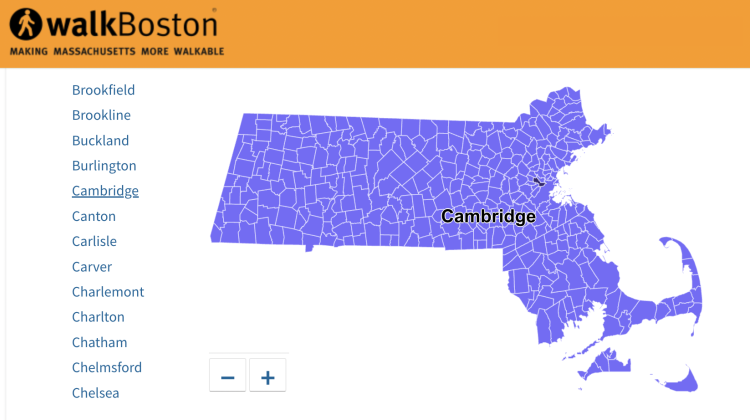Leveraging Urban Science to Improve Walkability

Screenshot of the Report a Problem website interface
How might urban science help Massachusetts improve accessibility and walkability, particularly for aging communities? Over the summer of 2022, DUSP’s Keili Tucker worked with the pedestrian advocacy organization, WalkBoston, to build a digital tool to connect folks with resources for reporting physical barriers to walkability. Her work built on existing WalkBoston age friendly work with travel trainers, which aims to identify and solve unmet mobility needs.
Tucker is an MIT senior majoring in 11-6 (Urban Science and Planning with Computer Science). In addition to her undergraduate degree, Tucker is also enrolled in the SB/MCP program, where students earn both a Bachelor of Science and the Master of City Planning degree at the end of their five years at MIT.
“I came to MIT wanting to study bioengineering until I participated in the Priscilla King Gray Public Service Center’s (PKG Center) first-year pre-orientation program called Active Community Engagement (ACE), and learned of the existence of urban planning. Several of my counselors were DUSP students, and I loved the way they viewed and spoke about the city. Justin Steil led a walking tour of Boston on one day of ACE, and I was amazed by all of the layers of stories that he pulled out of our surroundings,” said Tucker. “These experiences provided me with the vocabulary to conceptualize, talk about, and address problems I had seen throughout my life.”
WalkBoston is a non-profit that partners with community organizations and members as well as municipal and state agencies to advocate for more inclusive, safe, and enjoyable pedestrian environments across the state of Massachusetts. Tucker’s summer internship with WalkBoston was supported through the MIT PKG Center. The PKG Center provides support for members of the MIT community seeking to utilize the skills and education they receive at the Institute for public service.
“WalkBoston works with people who are committed to creating positive change in their neighborhoods, whether teens in Boston neighborhoods, startup advocacy groups like WalkBike Worcester or WalkBike Springfield, or Councils on Aging in small Berkshires’ villages. We engage in long-term efforts to build local knowledge to win improvements in the walking environment,” said MIT alumna and WalkBoston Senior Policy Advisor, Wendy Landman (SB ‘75, MCP ‘78). “The opportunity to work with MIT interns has allowed WalkBoston to take a deeper dive into some of the issues that we encounter and call on the skills that each intern brings to our work. We are especially excited to learn from the fresh perspectives that MIT students bring to WalkBoston - and to have the interns harness their problem-solving skills to add new ways that we can build our advocacy effectiveness. Keili jumped into WalkBoston’s work, and created a terrific new online tool that will allow our partners around the state to quickly find out who they should contact to improve walking conditions. We are excited to continue our long tradition of working with MIT students!”
“What drew me to 11-6 was the idea that I could learn some really exciting technical skills to apply to the kinds of community-scale issues that I care about. Urban Planning and Social Science Laboratory (11.188) and Modeling Pedestrian Activity in Cities (11.024) are two classes which epitomize my love of urban science. In the first, I learned how to use GIS to make meaning from buckets of data, understanding that maps aren’t an objective medium, so we must be thoughtful with the narratives we create. In the second, I learned how to use the Rhino Urban Network Analysis Toolbox to analyze bike and pedestrian networks, which solidified my interests in active transportation,” said Tucker. “My WalkBoston internship gave me an opportunity to use these skills and knowledge to help folks move around cities in a more sustainable and healthy manner.”


